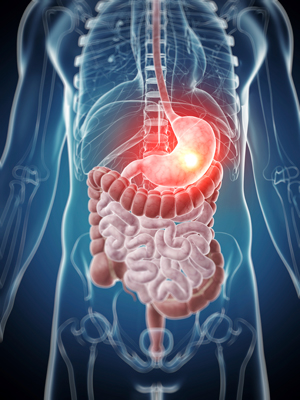Tricks and tips you’ll take away from the Holistic Approaches to a Fully Functional Gut course
 Interested in learning more about the gastrointestinal system and how you can help your clients improve their response to training and overall wellbeing?
Interested in learning more about the gastrointestinal system and how you can help your clients improve their response to training and overall wellbeing?
The Holistic Approaches to a Fully Functional Gut course is a two-day, in-depth workshop on the functions and dysfunctions of the digestive tract and the different approaches that will bring it back to full health.
The course is full of tricks and tips that will transform the way you consider GI health. Here’s a little taster of what you’ll learn…
Reflux misconceptions
Within the medical field, acid reflux is thought to be caused by excessive amounts of acid in your stomach, which is why acid-blocking drugs are typically prescribed or recommended. In most cases, however, this is a misconception as the problem often results from having too little acid in the stomach.
After food passes through your oesophagus into your stomach, a muscular valve called the lower esophageal sphincter (LES) closes, preventing food or acid from moving back up.
Acid reflux occurs when the LES relaxes inappropriately, allowing acid from your stomach to flow backward into your oesophagus.
It’s important to understand that acid reflux is a symptom commonly related to factors that cause the LES to relax. You will learn more about these factors on the course.
Stomach or duodenum? Ulcer diagnosis and treatment
Peptic ulcer symptoms include: vague discomfort and generally localised diffused pain, belching and burping. Symptoms typically worsen when eating.
Duodenal symptoms include: pain radiating towards the back, nighttime discomfort, belching, bloating, distention and fatty food intolerance. Symptoms are often relieved by food intake.
Learning how to resolve these symptoms is the next step.
Recognise indicators of pancreatic enzyme insufficiencies
Many of these symptoms could be mislabelled as IBS. On the Fully Functional Gut course you will learn more about the body’s response to pancreatic enzyme insufficiencies, which include:
- Steatorrhoea – undigested fat in stools
- Bloating, discomfort, pain – within one hour of eating
- Reflux/indigestion
- Drowsiness after meals
- Loss of appetite
- Food allergies/sensitivities
- Low zinc, B12 and folate absorption
- Gas
- Undigested food in the stool
- Common in fungal and parasitical problems
How to help someone suffering from IBS
IBS is a very common GI complaint. Emma Lane will teach you how to use the best natural remedies and behavioural changes to resolve issues with your clients as quickly as possible. The following points are just a few issues that are discussed on the course…
- The brain‐gut connection – this is very important due to the action of the PSNS on digestions and gut motility.
- Dysbiosis – microbial imbalance must also be considered and could be due to a recent infection or use of antibiotics.
- Parasites – parasitic infection is often overlooked, for example Blastocystis hominis, which is a protozoa.
Benefits and uses of probiotics
The benefits of probiotics are well documented but what’s the difference between lactobacillus acidophilus and bifidobacteria? What are their roles in GI health and how to recommend the best supplements on the market?
Lactobacillus acidophilus
- Prevents the overgrowth of disease-causing microbes: candida species, E.coli, H. pylori and salmonella;
- Prevents and treats antibiotic-associated diarrhoea;
- Aids digestion of lactose and dairy products;
- Improves nutrient absorption;
- Maintains integrity of intestinal tract and protects against macromolecules entering bloodstream and causing anti-genic response;
- Lessens intestinal stress from food poisoning;
- Acidifies the intestinal tract; low pH provides a hostile environment for pathogens and yeasts;
- Helps to prevent vaginal and urinary tract infections.
Bifidobacteria
- Prevents colonisation of the intestine by pathogenic bacteria and yeasts by protecting the integrity of the intestinal lining;
- Produces acids, which keep the pH balance in the intestine. This acid environment prevents disease-producing microbes from getting a foothold;
- Lessens the side effects of antibiotic therapy;
- Inhibits the growth of bacteria, which produces nitrates in the bowel. Nitrates are bowel-toxic and can cause cancer;
- Helps prevent production of and absorption of toxins produced by disease-causing bacteria, which reduces the toxic load of the liver;
- Manufactures B-complex vitamins;
- Helps regulate peristalsis and bowel movements;
- Prevents and treats antibiotic-induced diarrhoea.
Want to learn more? Sign up to the next Holistic Approaches to a Fully Functional Gut course today.
‘Emma’s GI course is absolutely first rate. Don’t waste your time doing functional diagnostic courses or learning how to interpret blood tests until you have mastered what is in her two-day course. She will show you that most people’s problems start with how, when and what they eat and that until you have dealt with these problems it is utterly pointless spending a lot of money on lab tests and supplements. Her course is ESSENTIAL to anybody working as a health care professional and anybody who wants to “be healthy”.’
Chris Maund – BSc Hons PE and Sports Science, C.H.E.K Certified, NMT Certified
Courses
Mission Statement
Our vision is that health practitioners can develop the skills and knowledge to employ a variety of practical methodologies that safely bridge the gap between conventional Western medicine and holistic healthcare practices.
Through our training courses we aim to give practitioners, whatever their approach to health and wellbeing, the knowledge, skills and tools that will enable them to deliver the best possible approaches to resolve their patients or client’s health challenges.
© Integrative Health Education 2014-2024 | Terms & Conditions | Privacy Policy
